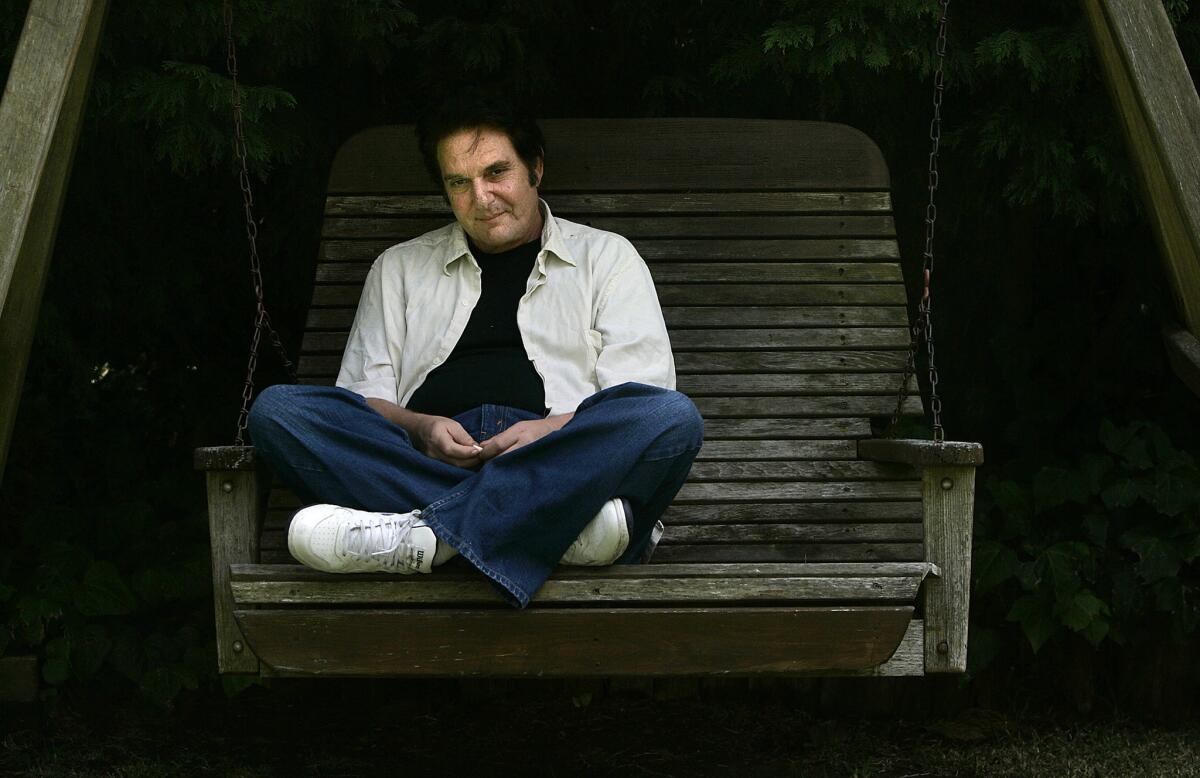P.F. Sloan dies at 70; wrote ‘60s protest song ‘Eve of Destruction’

P.F. Sloan, shown at his Los Angeles home in 2006, wrote the famous 1960s protest song “Eve of Destruction.”
- Share via
When P.F. Sloan was 19 and living with his parents, he wrote five songs in one night, ending at 4 a.m. with “Eve of Destruction,” a Dylan-esque lament that would soar to the top of the charts in 1965.
“Eve of Destruction” was a bleak, angry look at what a bloody mess the world had become. It was about “violence flarin’, bullets loadin’,” about injustice, hypocrisy, the Bomb, racism, denial and doom.
But when Sloan, still excited from his night of creativity, tried to tell his mother about his apocalyptic new work, she shushed him.
“You’re going to wake your father,” she said. “Tell me about it in the morning.”
Sloan, who sold his first song at 13 and whose hits included Johnny Rivers’ “Secret Agent Man” as well as songs recorded by the Turtles, Herman’s Hermits, the 5th Dimension, and the Mamas & the Papas, died Sunday at his home in Los Angeles. He was 70.
He had pancreatic cancer, his publicists said in a statement.
A few years after he became famous for his protest anthem, Sloan dropped from public view. For decades, he suffered from severe depression. He was hospitalized and claimed he had been given “lobotomy pills.” Whole years disappeared from his memory.
“I was ill I guess for a good 20, maybe 25 years,” he told The Times in 2006. “It’s been overcome and there’s hope…. I mean, depression and hypoglycemia, it’s a tremendous battle…. Catatonia for a long time.”
But there was a flip side: “The only good thing about it was that I missed the whole disco era,” he jokingly told an interviewer earlier this year.
Born in New York City on Sept. 18, 1945, Phillip Gary Schlein was raised on Long Island before his family moved to Los Angeles when he was 12. His father, a pharmacist, changed his name to Sloan to avoid anti-Semitism. Phillip ended up choosing P.F. because his sister used to call him Flip.
When Sloan was 13 and still a guitar novice, he encountered Elvis Presley at Wallach’s Music City in Hollywood. The King gave him a quick lesson in the otherwise empty store, teaching him “Love Me Tender.”
“Elvis stared deeply into my eyes,” Sloan wrote in his 2014 memoir, “What’s Exactly the Matter With Me?” “He took me to a timeless place.”
Around the same time, his family’s cleaning woman heard that Aladdin Records, a mostly African American label, was auditioning young singers. She encouraged young Phil, who made his debut recording with “All I Want Is Loving” and “Little Girl in the Cabin.” Aladdin soon folded.
By the time he was 16, Sloan was a professional songwriter. But even churning out pop hits for big labels with co-writer Steve Barri failed to make him feel like anything but an outsider.
His hits, with Barri, included the Turtles’ “You Baby,” the Grass Roots’ “Where Were You When I Needed You?” and many others.
Then “Eve of Destruction” happened.
“It was the night P.F. Sloan was born,” he wrote.
“I wanted to be loved. I wanted to be Elvis. I wanted to be Ricky. I wanted to be Bobby and Tony and Frankie… But P.F. Sloan? He wanted honesty and truth.”
Seen as inflammatory, the song was condemned by educators and banned by some radio stations. But it remained in the top 20 in the U.S. for two months.
It also was credited with boosting momentum for passage of the 26th Amendment.
Signed into law in 1971, the measure lowered the voting age from 21 to 18. Supporters rallied around a couple of Sloan’s lines:
You’re old enough to kill but not for votin’
You don’t believe in war but what’s that gun you’re totin’?
But “Eve of Destruction” created a powerful backlash. Infuriated by its anti-establishment provocations, right-wing forces orchestrated his downfall, Sloan contended. Billboard magazine was pressured to get his song off the charts and his record label, Dunhill, cheated him out of his royalties, he said.
Sloan ended up living with his parents until they died, and then sleeping on his sister’s couch. He worked sporadically, delivering beer and doing telephone solicitations when he was physically and mentally up to it.
In 1986, he became a devotee of Sai Babi, an Indian guru, and started making periodic trips to India. Twenty years later, he began performing occasionally. Last year, he released his final album, “My Beethoven.”
In January, he performed “Eve of Destruction” at an Altadena coffeehouse with Barry McGuire, the singer who helped make it such a raging success in 1965.
In retrospect, he told the Wall Street Journal, the song “sounds naïve — especially in today’s world, with ISIS, ongoing wars and all these terror attacks. I was coming from the point of view that we can fix this, really — if we put our attention to it. Talk about naïve.”
McGuire noted that audience members, like the performers, were of a certain age.
“Everybody’s embarrassed to get up and dance,” he said. “So when we played ‘Eve,’ we got a standing ovation.”
More to Read
Start your day right
Sign up for Essential California for the L.A. Times biggest news, features and recommendations in your inbox six days a week.
You may occasionally receive promotional content from the Los Angeles Times.







